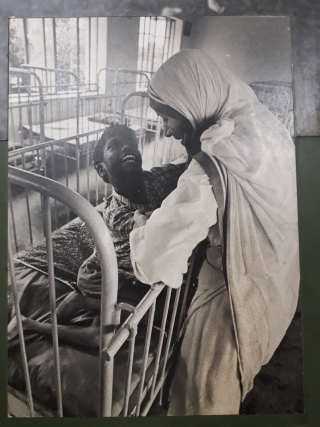Forgiveness
Grow Proficient in Forgiveness: Practice Small Acts of Love
Practice small acts of love toward others first before forgiving offenders.
Updated April 24, 2024 Reviewed by Lybi Ma
Key points
- "I am just not able to forgive." This is a common lament when a person has been treated with deep unkindness.
- One way forward is first not to practice forgiving the person, but instead to shift your focus onto others.
- As you focus on others who have not hurt you, try to practice what I call: Service love toward them.
- Practicing service love over the coming weeks prepares you to view the offending person differently.

“I am so sick of feeling lousy. When my spouse abandoned me, that was a long time ago. I did not realize, at the time, that the effects of that betrayal would live in my heart for years. It is time to confront this and change, but I wonder if forgiving is too much for me.” This is not a rare lament. I have heard such cries for help from those who have experienced deep injustice and yet, when the idea of forgiveness is brought up, people are not necessarily eager to enter this realm.
When people have been treated severely unjustly by another, it is hard to forgive. For example, when Suzanne Freedman, Ph.D., began her forgiveness work with incest survivors, virtually all of them said that they would never forgive, that it just was too much for them (Freedman and Enright, 1996). This certainly is understandable given the gravity of the injustice. Yet, in the end, all of the participants in our study were able to forgive and shed psychological depression.
If your heart has been crushed by another person's (or even other persons') injustices against you, it is good to prepare for forgiveness before entering the forgiveness arena. At such times, I recommend certain preparations before starting to forgive (Enright, 2015). Such preparations are meant first to transform your inner world for the better before you begin the process of forgiving. There are moments when we can confront pain head-on and willingly choose to start forgiving. At other times, it is preferable to take a step back and prepare carefully so that your heart is stronger and ready to forgive. This essay deals with one possibly important preparation for you before forgiving anyone who has deeply hurt you. We need to be certain that your heart, your psychological heart, is strengthened and more inclined to forgiveness before you move forward with it as a healing strategy.
First Understand Love and Practice It
I do not mean romantic love when I use the word love. Rather, I am discussing the kind of love Martin Luther King, Jr. expressed in his book, Strength to Love. His home was being firebombed when he was writing that classic work. Despite this challenge, he called on his readers to see the worth in others and not to retaliate with hatred. This is selfless love, done for others and not the self. Gandhi exhibited this kind of selfless love when he participated in hunger strikes to support the people of India.

It is this kind of love that Mother Teresa extended to Calcutta's impoverished population when she braved the streets to save and tend to the sick and dying. She was serving others by offering herself. The kind of service love is seen in the adult child caring for an aging parent—it takes effort and can even be painful to extend this kind of love to others for their good.
Cultivating this form of love is more difficult than, for example, the mutual affection that characterizes an engaged couple. It is more difficult since it costs the one who loves, especially when that love is not returned. Maturing in this kind of love requires time and effort.
Practice Service Love Before Forgiving
I call this “service love” because it is in service to other people, not done for one’s own benefit. As an exercise for today and in the coming weeks, recognize three or more possibilities you have to spread a little more service love throughout your family or community.
For instance, you could take the time to smile at a cashier who appears worn out and under pressure at work. You may spend more time with a friend who needs your attention, even if you are exhausted. Consider getting the family together to select a worthy organization and make a financial donation. What other acts of love-giving could you think of doing today? What other creative ideas can you generate about this kind of love for tomorrow and next week? The point is to begin softening your heart toward others who have not crushed your heart so that you can grow more deeply in service love.
When It Is Time to Forgive
I am not suggesting that your first move in forgiving is to start loving the one who was cruel to you. Instead, take a smaller step. When you practiced service love toward a cashier or a friend, were you aware of seeing the personal worth in this person? Were you aware that you were seeing this person as special and unique as a person? Were you aware that you certainly did not wish ill on this person? These insights can be brought to the forgiveness arena with the one who harmed your heart. Can you see that this person has worth, not because of the injustice, but despite it? Can you see the humanity in the other? Are you aware that you can commit to not harming this person who offended you, just as you did, even if subconsciously, toward those you gave service love in the past days and weeks?
In Conclusion
Learning to practice service love toward a tired co-worker or family member when you are busy and under pressure can be good preparation for your heart to now be ready, at least in time and when you so choose, to offer even a little of this to those who have deeply offended you. As you do that, this service love actually acts as an antidote to your inner discontent, to your inner anger. The practice of service love can slowly remove some of that anger until the majority of that anger is dissipated. A heart prepared for this kind of love through daily practice can assist you in forgiving deeply and well, with the result that you are healed from the inner discontent that could be with you for years without working toward forgiveness.

References
Enright, R.D. (2015). 8 keys to forgiveness. Norton.
Freedman, S. R., & Enright, R. D. (1996). Forgiveness as an intervention goal with incest survivors. Journal of Consulting and Clinical Psychology, 64(5), 983-992.




